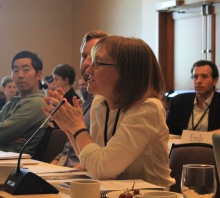Economic Inequality
What are the consequences of the rise of income inequality in the United States – for the economy, society, and democracy?
In 2007, the wealthiest 1 percent of Americans received more than 23 percent of total income for the first time since 1928 [1]. But unlike in the 1930s, levels of inequality seem unlikely to fall; in 2012, the share of income going to the top 1 percent of families remained remarkably high at 22.5 percent [2].
This rise in inequality is correlated with a number of worrisome economic and political outcomes. For example, the share of income controlled by the top 1% of earners has peaked twice this century, followed both times by major financial crises, but there is little understanding of possible connections between those phenomena. Nor do we know whether income concentration at the top of the distribution is related to sluggish wages and household insecurity on the lower rungs of the income ladder. It is also unclear how the growing economic strength of the richest Americans (including the most successful players in the financial sector) translates into political power in our democracy. All told, the nation has seen a sea-change in the distribution of income and wealth over the past four decades, but our understanding of the consequences remains remarkably limited. In fact, there is no academic consensus about a link between economic inequality and any other national outcome.
In order to build this understanding, the Tobin Project’s Economic Inequality research initiative is investigating inequality’s effect on individual behavior and decision making with the aim of identifying the causal mechanisms by which inequality affects our economy, democracy, and society. Through interdisciplinary research and collaboration with policymakers, Tobin’s Economic Inequality initiative aims to shed new light on these critical questions and help determine and understand the potential consequences of economic inequality.
Questions within the broader initiative include:
Inequality & Decision Making: How do high and/or rising levels of inequality influence individuals’ decision-making, and how might such effects impact the broader society?
[1] Atkinson, A. B., Piketty, T., & Saez, E. (2011). Top Incomes in the Long Run of History. Journal of Economic Literature, 49(1), 3-71
[2] Saez, Emmanuel (2013). Striking It Richer: The Evolution of Top Incomes in the United States. Updated with 2012 preliminary estimates on September 3, 2013. Originally published in Pathways Magazine, Stanford Center for the Study of Poverty and Inequality, Winter 2008, 6-7.
See also: The World Top Incomes Database


